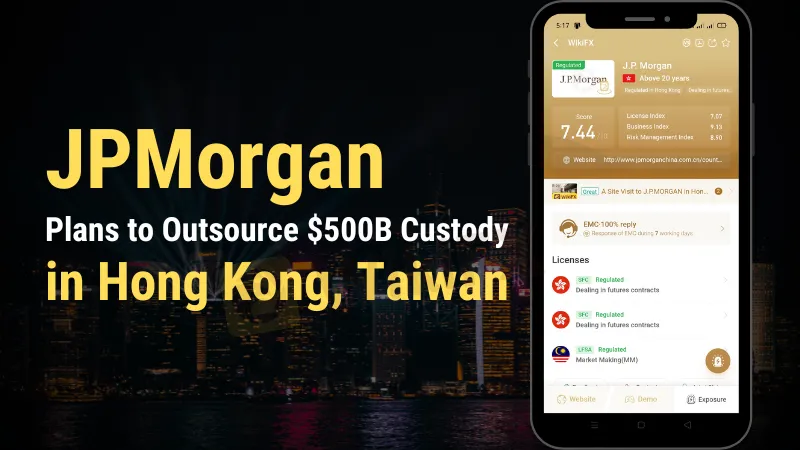简体中文
繁體中文
English
Pусский
日本語
ภาษาไทย
Tiếng Việt
Bahasa Indonesia
Español
हिन्दी
Filippiiniläinen
Français
Deutsch
Português
Türkçe
한국어
العربية
JPMorgan Plans to Outsource $500B Custody in Hong Kong, Taiwan
Abstract:JPMorgan to outsource $500B local custody business in Hong Kong and Taiwan, marking a strategic pivot in its Asia Pacific operations amid global shifts.

JPMorgan Chase (JPM.N), a worldwide leader in financial services and the world's third-largest custodian, has announced plans to outsource its local custody operations in Hong Kong and Taiwan, demonstrating its strategic adaptability. According to people familiar with the situation, this move has set the way for large firms like Citigroup (C.N), HSBC (HSBA.L), and Standard Chartered (STAN.L) to possibly take up this significant task.
A Strategic Decision Amid Global Shifts
Currently, JPMorgan manages approximately $520 billion in client assets under custody (AUC) in these vital North Asian markets. This strategic realignment, while keeping the financial specifics under wraps, marks a notable transition in the bank's approach to its Asian operations.
The custody business, a cornerstone of financial services, involves safeguarding clients' securities and ensuring the efficient handling of transactions. Local custody services, focusing on domestic market transactions, differ from global custody services that manage cross-border investments and maintain extensive client networks. JPMorgan's decision to withdraw from local custody services in Hong Kong and Taiwan, while continuing to provide global custody solutions, signals a refocused prioritization.
JPMorgan's Strategic Evolution in Asia Pacific
This move is part of JPMorgan's broader strategy in the Asia Pacific region, which has seen it exit from local custodian services in markets like Australia and South Korea. The evolving macroeconomic landscape, coupled with geopolitical tensions, has significantly impacted investment flows and asset management strategies. Particularly, the ongoing Sino-U.S. tensions and a cooling Chinese economy have led to notable shifts in investment patterns, including substantial outflows from China and Hong Kong equities.

The Role and Importance of Asset Custodians
Asset custodians are fundamental to the finance industry, ensuring the safekeeping of investors' securities and managing essential transactions and settlements. They play a crucial role in maintaining compliance with various regulatory and tax requirements. However, with the evolving market dynamics, local custodian services have become less lucrative compared to global operations, prompting JPMorgan to reassess and realign its business focus.
JPMorgan's Continued Market Presence and Growth
Despite this strategic withdrawal from certain segments, JPMorgan continues to be a dominant force in the global custodian sector. The bank oversees an impressive $29.7 trillion in global client custody assets. In the third quarter of this year alone, JPMorgan reported a 9% increase in year-on-year revenue in its securities services division, which includes its extensive custody operations. This decision represents not just an operational shift but a strategic adaptation to the changing global financial ecosystem.
Future Prospects and Industry Implications
This move by JPMorgan is not just a business decision but a reflection of the changing dynamics in the global financial services industry. It signifies a strategic pivot towards more profitable and scalable segments of the custody business, aligning with the bank's overall growth strategy and market positioning.
Conclusion
JPMorgan's choice to outsource its local custody operations in Hong Kong and Taiwan was deliberate, demonstrating the bank's resilience and strategic vision in a volatile global financial context. JPMorgan is not only reacting to current market circumstances but also positioning itself for future success by concentrating on sectors with better development potential and profitability. This shift, which is scheduled to be completed by the end of next year, represents a new chapter in JPMorgan's operations in the Asia Pacific region, underscoring the bank's position as a dynamic and forward-thinking global custodian.
Bottom Line
JPMorgan's strategic reorientation in Hong Kong and Taiwan epitomizes its ability to navigate the complexities of the global financial market. This move, while marking a shift in its service offerings, underscores the bank's commitment to innovation and excellence, ensuring its continued leadership in the global custody domain.

Disclaimer:
The views in this article only represent the author's personal views, and do not constitute investment advice on this platform. This platform does not guarantee the accuracy, completeness and timeliness of the information in the article, and will not be liable for any loss caused by the use of or reliance on the information in the article.
Read more

SEC Ends Crypto.com Probe, No Action Taken by Regulator
The SEC has closed its investigation into Crypto.com with no action taken. Crypto.com celebrates regulatory clarity and renewed momentum for the crypto industry.

Bitpanda Secures Full Broker-Dealer License in Dubai
Bitpanda has officially obtained a full broker-dealer license from the Dubai Virtual Assets Regulatory Authority (VARA), marking a significant milestone in its international expansion. This approval, which follows preliminary authorization granted three months earlier, enables the European digital asset exchange to introduce its comprehensive suite of virtual asset services to investors in the United Arab Emirates (UAE).

Interactive Brokers Expands Crypto Trading with Solana, XRP, Cardano, and Dogecoin
Interactive Brokers adds Solana, XRP, Cardano, and Dogecoin to its platform, enabling U.S. and U.K. clients to trade crypto 24/7 with low fees.

Gold Surges to New Highs – Is It Time to Buy?
Recently, gold prices have once again set new records, surpassing $3,077 per ounce and continuing a four-week winning streak. Is It the Right Time to Invest?
WikiFX Broker
Latest News
Why Are Financial Firms Adopting Stablecoins to Enhance Services and Stability?
Experienced Forex Traders Usually Do This Before Making a Lot of Money
Octa vs XM:Face-Off: A Detailed Comparison
When High Returns Go Wrong: How a Finance Manager Lost RM364,000
Bridging Trust, Exploring Best—WikiEXPO Hong Kong 2025 Wraps Up Spectacularly
Interactive Brokers Expands Crypto Trading with Solana, XRP, Cardano, and Dogecoin
Fidelity Investments Explores Stablecoin Innovation in Digital Assets Sector
Why More People Are Trading Online Today?
SEC Ends Crypto.com Probe, No Action Taken by Regulator
Broker Comparison: FXTM vs XM
Currency Calculator







